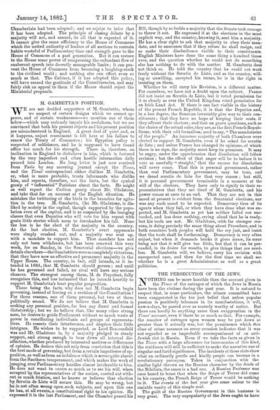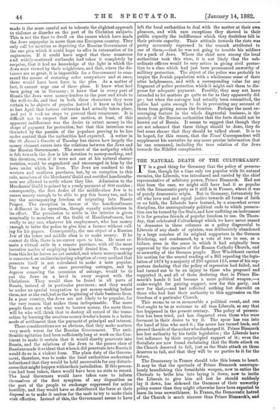THE PERSECUTION OF THE JEWS. N OTHING can be more horrible
than the account given in the Times of the outrages of which the Jews in Russia have been the victims during the past year. It is natural to suspect that, in some particulars, the crimes committed have been exaggerated in the too just belief that unless popular passion is positively inhuman in its manifestations, it will, now-a-days, be passed over as scarcely worthy of notice. But there can hardly be anything more than exaggeration in the Times' account, even if there be as much as that. For example, the number of outrages upon women may be put down as greater than it actually was, but the prominence which this class of crime assumes on every occasion indicates that it was not regarded as an improbable accompaniment of an anti- Jewish riot in Russia. Even if we take the facts as given in the Times with a large allowance for inaccuracies of this kind, the residuum will still be sufficient to make the narrative one of singular and lurid significance. The incidents of these riots show what an ordinarily gentle and kindly people can become in a revolutionary paroxysm. Taken in conjunction with the similar light thrown on the Russian character by the deeds of the Nihilists, the omen is a bad one. A Russian Professor was once heard to boast that when the Reign of Terror did come in his country, the French Reign of Terror would be nothing to it. The events of the last year give some colour to' the amiable vanity of this simple soul. The guilt of the Russian Government in this business is very great. The very unpopularity of the Jewspought to have made it the more careful not to tolerate the slightest approach to violence or disorder on the part of its Christian subjects. This is not the time to dwell on the causes which have made the Jews unpopular in more than one European country. They only call for mention as depriving the Russian Government of the one plea which it could hope to offer in extenuation of its supineness. If it could have urged that these numerous and widely-scattered outbreaks had taken it completely by surprise, that it had no knowledge of the light in which the Jews were viewed by their- neighbours, and that, where the dis- tances are so great, it is impossible for a Government to com- mand the means of restoring order everywhere and at once, there would have been force in the plea. As a matter of fact, it cannot urge one of these pleas. It knew what had been going on in Germany ; it knew that in every part of Russia the Jews were money-lenders to the poor and rivals to the well-to-do, and that in both these characters they were certain to be objects of popular hatred ; it knew as far back as last April that furious outbreaks had actually taken place, and yet it tcok no steps to prevent their recurrence. It is difficult not to suspect that one motive, at least, of this apparent indifference was the desire to extort money in the shape of payment for protection, but that this intention was thwarted by the passion of the populace proving to be less under control than the authorities had expected. A writer in the St. James's Gazette of Tuesday has shown how largely the 'money element enters into the relations between the Jews and the Russian Government. The secret of the antipathy which is felt towards the Jew is his devotion to money-making, and this devotion, even if it were not one of his natural charac- teristics, would be engendered and encouraged in him by the laws under which he lives. The Jews are confined to the western and southern provinces, but, by an exception to this rule, members of the Merchants' Guild and certified handicrafts- men are allowed to settle where they like. Admission to the Merchants' Guild is gained by a yearly payment of 800 roubles ; -consequently, the first desire of the middle-class Jew is to amass money enough to be able to pay this heavy tax, and to buy the accompanying freedom of migrating into Russia Proper. The exception in favour of the. handicraftsman is different in its operation, though equally mischievous in its effect. The permission to settle in the interior is given nominally to members of the Guild of Handicraftsmen, but really to any one, whatever his employment, who has money enough to bribe the police to give him a licence without call- ing for his papers. Consequently, the one object of a Russian . Jew of the lower and middle class is to make money. If he cannot do this, there is no career open to him. He must re- main a virtual exile in a remote province, with all the most lucrative modes of employing himself denied him. To escape from this lot he leaves no art untried, and where money-making is concerned, an undiscriminating adoption of every method that presents itself is not calculated to make a man popular. The true way of at once preventing outrages, and by degrees removing the occasions of outrage, would be to put the Jews on a level in every respect with the Christians. They would then be found in all parts of Russia, instead of in particular provinces ; and they would be under no special temptation to put money-making before them, not as the end,but as the beginning of their business lives. In a poor country, the Jews are not likely to be popular, for the very reason that makes them indispensable. The more people there are who want to borrow money, the more there will be who will think that to destroy all record of the trans- action by burning the usurious money-lender's house is a better mode of settlement than the payment of principal and interest.
These considerations are so obvious, that they make matters very much worse for the Russian Government. The anti- Semitic agitation had been sufficiently long at work on the Con- tinent to make it certain that it would shortly penetrate into Russia, and the relations of the Jews to the poorer class of Russians made it evident that when it did penetrate into Russia it would do so in a violent form. The plain duty of the Govern- ment, therefore, was to make the local authorities understand beforehand that they would be held answerable for any disturb- ances that might happen within their jurisdiction. If this precau- tion had been taken, there would have been no riots to record. The local Governors would have taken care to inform themselves of the first symptom of any disposition on the part of the people to exchange suppressed for active hostility, and they would have so distributed the force at their disposal as to make it useless for the mob to try to make their wish effective. Instead of this, the Government seems to have left the local authorities to deal with the matter at their own pleasure, and with rare exceptions they showed in their public capacity the indifference which they doubtless felt in their private capacity. Their attitude towards the riots was pretty accurately expressed in the remark attributed to one of them,—that he was not going to trouble his soldiers for a pack of Jews. Where the chief men among the local authorities took this view, it is not likely that the sub- ordinate officers would be very active in giving civil protec- tion to a class which had just been pronounced unworthy of military protection. The object of the police was probably to inspire the Jewish population with a wholesome sense of their utter helplessness, and with a corresponding value for any fragment of police protection which it might suit them to dis- pense for adequate payment. Possibly, they may not have intended to let matters go quite so far as they apparently did go ; but when the outrages had actually been committed, the police had quite enough to do in preventing any account of them from getting across the frontier. Perhaps the most en- couraging feature in the whole disgraceful business, is the anxiety of the Russian authorities that the facts should not be known out of Russia. It seems to suggest that though they are not ashamed that these things should be done, they do feel some shame that they should be talked about. It is to be hoped, for this reason, that the Times' Correspondent will supplement his narrative by any more precise information that he can command, including the true relation of the Jews towards the Nihilist conspiracies.







































 Previous page
Previous page